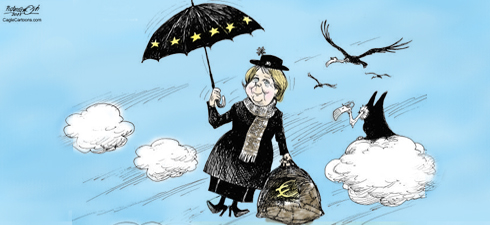Those analysts most severe in their criticism of Germany’s actions in Europe say that at the start of the crisis Germany was always inflexible, that mid-game it was prepared to give in and change its mind, and that now, nearing the end game, it is once more standing firm, back in its initial position and ruling out any changes to it in these decisive final moments.
What will happen now, in this stage of existential doubt over the euro? For a few days it seemed that Angela Merkel, Chancellor, and her finance minister, Wolfgang Schauble, accepted the proposition of the southern countries like Spain and Italy, supported by France, traditional partner of Berlin but afraid of being backed into a corner by Germany: that the European Central Bank (ECB), together with the European bail-out funds, would come to the rescue of their doomed sovereign debt.
Opinion these days has tended to emphasise that Germany has shifted its position, even though its two most visible leaders in this matter have not made a single statement backing that purchase of debt or any other additional measure. However, from Germany there has clearly emerged the outright rejection by the economic establishment, led by the Bundesbank, Germany’s central bank. Influential German economists, politicians and industrialists have rallied round this flagship institution. The arguments of the debate are known, and they are not worth repeating here.
More interesting is whether the obstinacy of the President of the Bundesbank, Jens Weidmann, reveals a real split with Merkel's government or whether it’s about a sharing of roles, since the chancellor, for her part, has in recent weeks said “No” in all possible ways.
A historic day
It is obvious that Merkel cannot go back to the Bundestag to request more resources for another bailout, which was just around the corner for Spain and Italy, as the markets were anticipating too – right up until Mario Draghi, the head of the ECB, delivered his spell-binding utterance last week.
Without the political space to orchestrate a Greek-style bailout and under unyielding pressure from the markets, the most comfortable solution for Merkel was to dump the dossier into the hands of the ECB, which in national terms means the Bundesbank. The latter, observing the manoeuvre – that is, it would be the bank that would run the risk of absorbing the losses if the operation turns out badly – has stonewalled.
This would be the logic of a clash between Merkel and the bank, and not the logic of a division of roles. If this scenario is true, the ECB council meeting on Thursday will see the emergence of an alliance between central bankers from southern Europe and the majority of the eurozone governments, including Germany, against the Bundesbank and some allied central banks. A historic day.
Under the second scenario – in which Merkel left it to the Bundesbank to stonewall and Draghi was merely mouthing empty words – we will see on Thursday an authentic fiasco, with the ECB left hardly any room for manoeuvre and stripped of its authority by the powerful states of the eurozone, even if it does win the formal vote. A nightmare scenario.
Opinion
Save the euro without scaring Germany
“The entire world is worried that the solution to the crisis will come a cropper on German ordoliberalism — and in particular on its insistence that a central bank cannot buy sovereign bonds,” remarksFrankfurter Rundschau in an editorial which defends European Central Bank (ECB) intervention to save the euro. The centre-left daily sets out to refute the arguments against a decision to intervene, and in particular the injunction against the indirect provision of funds to member states via the ECB —
The ECB has a mandate to guarantee price stability. As it stands, we have a problem that is worse than inflation […] — a deflationary trend that is lowering prices. In this context, the purchase of bonds to stabilise the economy is entirely covered by its mandate.
The daily also argues that we should question the capacity of markets to determine the rates of interest for sovereign borrowing, especially in the context of the major errors made in recent years by investors who failed to notice the onset of the crisis —
Would it not be smarter to allow central banks to determine these rates of interest, instead of giving speculators’ whims free reign over prosperity and employment?
Finally, Rundschau points out that if the ECB acts appropriately, it will not have to contend with with an elevated risk of accumulating sovereign debt —
The ECB simply has to define a credible policy whereby it will buy all long-term debt that rises above a certain rate of interest, let’s say 5 %. [...] It’s a good bet that it will not have to spend a penny.
The only cloud on the horizon is the non-democratic nature of debt purchases by the ECB. With this in mind, the daily argues that the European Stability Mechanism (ESM) should act on behalf of the ECB, while using ECB funds, because the EMS is supervised by member state ministries of finance.
Was this article useful? If so we are delighted!
It is freely available because we believe that the right to free and independent information is essential for democracy. But this right is not guaranteed forever, and independence comes at a cost. We need your support in order to continue publishing independent, multilingual news for all Europeans.
Discover our subscription offers and their exclusive benefits and become a member of our community now!












